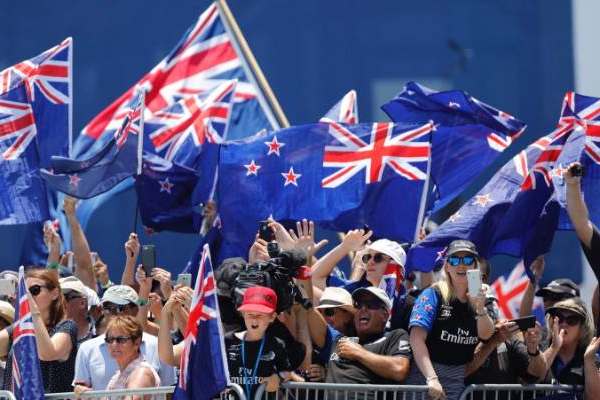Published on the 09/09/2020 | Written by Heather Wright

…

The digital gauntlet has been thrown down. How should exporters respond?…
Kiwi exporters have their foot on the accelerator and are investing for a digital post-Covid world, but as a nation, New Zealand still has lessons to learn when it comes to collaboration and partnership.
As New Zealand Trade and Enterprise global tech sector lead and a former trade commissioner to Singapore, Hayley Horan is well versed in partnership and collaboration.
Her job at NZTE sees her in a ‘connector’ role, gaining private sector sentiment and feeding it back through channels such as the government’s Industry Transformation Plans.
“The minute you change that shift from ownership to partnership, everything changes.”
The organisation is currently going through an intensification programme after gaining $216 million from the Covid-19 Response and Recovery Fund to increase the number of exporters it supports. The ramp-up will see the current 700 exporters currently ‘intensely supported’ double to around 1,400. Several thousand other exporters are also already supported through ‘one to many’ relationships.
Covid-19 has forced digital on all exporters, ready or not.
“We as a culture love to get on a plane. We are face to face people, we’re good sorts,” says Horan. “So when we find our channel partners it’s normally through connections that we have physically when we go to a market, a show, when we meet contacts.
“A real tension/opportunity now is how do you do that when you can’t leave your country?”
It might be an issue many weren’t quite ready to deal with, but Horan says the export sector has been quick to rise to the challenge – more than 200 companies went through NZTE’s ‘digital clinics’ in the first six weeks with another 200 in the pipeline and NZTE’s B2B workshop is completely sold out, while ads for staff with digital marketing capabilities are increasing, along with LinkedIn activity.
“We’re seeing excellent engagement where they are really putting their money where their mouth is and investing at a really, really scary time.”
The digital clinics are designed to help exporters develop their digital strategies, from channels to understanding and accessing customers and the data points underneath that which enable companies to start making data-driven decisions.
“A go to market plan always starts with what do you have, who is going to buy it, why would they buy it and where should we sell it,” Horan says.
“So if you just take that and put a digital lens on it, that’s basically a digital clinic. So what’s the digital supply chain, what’s the digital sales pipeline, how do we generate opportunities in a digital way is a key issue.
“That can be as simple as ‘have you got your LinkedIn B2B pipeline strategy set up? Do you understand the complexities and how you show up on an e-commerce platform in China?'”
It’s not only about getting up and running in the digital world, she says. Instead, different conversations are required with commercial partners and distributors.
“Where are those distributor relationships you have now – and I’m talking in a food and beverage context – what is their digital strategy, where are you leaving the responsibility for your sales in an international market? Normally you’d put your beautiful produce on a container and the distributor gets it and they’ve proven to you in a physical way that they can get out to a retail store for example, but what’s their strategy now?,” she asks.
“It’s partnering up and saying how are we going to do this together?”
That partnering up aspect is key for Horan. Three years as trade commissioner to Singapore has shown her the true value of collaboration and partnership – something she says is at the heart of Singaporean’s ethos.
[CONTINUES BELOW]
Hayley Horan interview (3:15):
While Kiwis might embrace the number eight wire mentality and desire to do things ourselves, Singapore starts with ‘who else is doing this and how do we collaborate and partner’.
“We are quite fractured when you think about it. And I’m not saying whether this is right or wrong, but we have 26 economic development boards, Singapore has one. we have probably 30-50 different tech ecosystems, Singapore probably has four. Each university puts their resources into a vertical, their universities don’t compete. It’s quite streamlined.
“It’s also the size of Taupo as well, so there are different reasons why, but I think we can learn a heck of a lot about collaborations and partnership.”
On that front, Horan notes there are plenty of technology companies in New Zealand who can support exporters, as they struggle to come to terms with a world of remote relationships.
“From a digital lens we’ve got our F&B companies who now can’t get on the plane and go and meet with their distributor, and we’ve got tech companies here in NZ who can help them go digital.”
What else sets Singapore apart? Horan’s quick to answer: Their long-term vision.
“When Singapore decides, as it did a few years ago, to be one of the leading financial hubs in the world, it went about investing in that, bringing the private and public sector together to work out problem statements: What problems would we need to solve that would make us globally relevant. They’re always in the globally relevant problems.
“They come up with problem statements. It sounds really simple, but they do this across all their transformation plans. How do we evolve the innovation landscape in order to deliver on these problems, how do we align our universities, our private sector…
“It’s not accidental that Google, Facebook, Amazon and everyone else is based in Singapore. It’s because they have made a conscious choice to be a certain way and solve certain problems and then they set up their whole structure to deliver on that.”
So should we try to mirror Singapore? Horan says no, there are deep rooted cultural differences between the two countries. And there’s also a much more local example we can look to: The Maori economy.
She says the Maori economy’s strength comes from its view of doing things for future generations and kaitiakitanga, or guardianship and stewardship.
“It doesn’t have the view that I own it, it’s we own this.
“We can learn more from our Maori leaders from a business sense on how they think because the minute you change that shift from ownership to partnership to the greater good, everything changes – the conversation changes, your business model changes and you’re thinking about beyond yourself.
“That doesn’t mean it’s not commercial, it just means it’s a different mindset and that’s the mindset that works in the Singapore context.”
Horan shares another observation on how the NZ tech sector is perceived, at least in Singapore, and it’s one which may run contrary to what many in the sector might think (or perhaps hope).
“If you were to start talking about tech, as I experienced this many times over three years in Singapore, people say ‘tech? really, New Zealand?…do you?’ so I think tech is a horizontal. It’s not a vertical.”
The call to action
Horan’s call to action is straightforward: Digital, digital, digital.
“It’s around your digital lead generation, how you’re going to sell in a digital way, how are you going to be world class, who can you partner with?”
“Another call to action is how are you going to connect with others who can help you, support you in an international market. How can you create the reach? That can be as simple as connecting into NZTE, or webinars, or even community groups in the same space in another market you are interested in,” she says.
“Our superpower is together. Let’s just break down some of those barriers and egos and just start talking to each other and have a few trade-off conversations, think about collaborations and partnership, because we truly are stronger together.”
The RtR series is a collaboration to provide an independent voice to the tech sector’s role in rebuilding a stronger, more digital post-Covid economy.
Other articles in the RtR series:

NZ’s digital tech sector ITP ‘vision’ unveiled
Read more
Manufacturing a Kiwi transformation
Read more
New Zealand ups the horsepower behind agritech
Read more
Tech sectors role in a digital NZ
Read more
Finding the vision for post-Covid NZ
Read more
Govt misses mark on digital recovery
Read more
Bringing New Zealand to you
Read more
Agritech, fintech and life sciences startups leading way for A/NZ
Read more



































